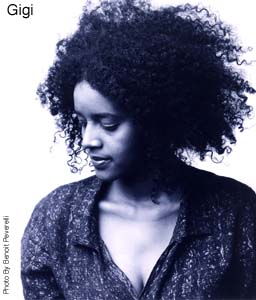Abyssinian Funk
Distinctive, yet filled with familiar accents, Ethiopian contemporary music draws upon a vibrant ancient history as well as an unlikely mix of modern sounds. With a history that can be traced to King Solomon and Abyssinian glory and a present plagued by war and famine, Ethiopia’s music reflects the unpredictable nature of life. The hallmark of native Amharic (the Amhara are the main ethnic group) music is a five-note pentatonic scale with long intervals, and it’s this unfinished tone that rings out from most modern Ethiopian tunes. But layered on top of this traditional foundation can be anything from jazzy riffs to digital dub beats, creating a multi-textured sound that heralds a new era of historical and musical blending.
Since the ’70s golden years of Ethiopian music, popular music has meant a fusion of some kind, and recent releases by popular singer Gigi and the sundry crew of Bole2Harlem stay true to this concept. Both Gigi’s Gold & Wax (Palm) and Bole2Harlem Volume 1 (Sounds Of The Mushroom) serve up funky, layered grooves that represent modern Ethiopia as well as nod to tradition.

Gold & Wax, picks up where she left off with an esoteric offering of tunes inspired by Genna (Ethiopian Christmas) and traditional dancing. Super producer/bassist Bill Laswell, also Gigi’s husband, lends his sonic touch with innovative arrangements. He creates a restrained Indian backdrop of master tabla and sarangi players that perfectly showcases his wife’s shimmering vocals.
The opening track, “Semena-Worck,” lays the foundation for the album’s jazzy, funk-filled direction. A stuttering beat and punchy horns deliver just the right uptempo backdrop for Gigi’s angelic vocals. Swerving from high-pitched wails to throaty chants, the fluidity and nuance of her voice takes center stage. A sense of spiritual redemption floats across the ethereal, midtempo melodies of “Jerusalem,” reminding listeners of Gigi’s church choir origins. With former P-Funker Bernie Worrell supplying organ leads on the high-spirited “Salam,” Gigi can’t help but sound like an Ethiopian Aretha Franklin, calling up the spirits of gospel, jazz, and soul in Amharic. The sophistication of Laswell’s production and Gigi’s skill at melding styles are highlighted on “Hulu-Dane.” India’s master sarangi (bowed string instrument) player and vocalist Ustad Sultan Khan provides an ancient, tribal flair to Gigi’s cross-cultural finesse.
If there’s one thing missing from Gold & Wax it’s lyric translations. The title alone references an ancient Abysinnian tradition (sam-ennawarq, literally wax and gold) of double entendre that proved very valuable for avoiding political censors during the military dictatorship of the ’80s and early ’90s. It would be nice to understand exactly what Gigi has written, but she has only left us with lovely songs that transcend cultural, if not linguistic, boundaries.
Producer David Schommer exhibits a markedly different perspective on Ethiopian music but with similar references. With a father who was one of the American founders of Addis Ababa’s first university, Schommer grew up in the U.S. but was entrenched in Ethiopian culture and folklore. He embarked on his first trip to Ethiopia six years ago, accompanied by Ethiopian American Amharic MC Maki Siraj. In Addis Ababa they discovered weak imitations of American hip-hop culture instead of traditional Ethiopian references. They decided to create their own vision for what contemporary Ethiopian music should embrace. The result, Bole2Harlem, bounces with African rhythms, Amharic rapping and singing, and electronic beats.
The title is also significant here because the album expresses as much about Ethiopia’s rich musical culture as it does Harlem’s dynamic African Diaspora. Gigi’s younger sister, Tigist Shibabaw, supplies vocals (she also appears on Gold & Wax), Bahia-born Davi Vieira provides percussion, Ethiopian bass player Henok Temesgen serves traditional licks, and Malian Balla Tounkara adds elegant kora playing for a truly multi-cultural mix. It’s significant that among all the added elements, the Ethiopian focus is never lost. Even over the unrestrained, booty-shaking funk of the title track and the hardcore, horn-accented rhythm of “Ensaralen Gojo,” Shibabaw and Siraj’s Amharic singing and rapping ensures Ethiopia is well represented. It throws a little dub (you can’t properly honor the land of Ras Tafari without at least a small nod to reggae), a little hip-hop, and a lot of funk into a pot with Ethiopian traditional music and never loses the essential flavor. Bole is the main entry point for Ethiopia, and Harlem is the main exit; Bole2Harlem seamlessly draws them together for the enjoyment of listeners everywhere.
– By Rosalind Cummings-Yeates










Truely great article and great Ethiopian Albums, I do own both and Gigi has been my most favorite East African singer for quite sometime… and the new crew Bole2Harlem has surprised me and my friends for representing fully even the Hip-hop and electronic beat impowers the artists, Kudo to Tigist Shibabaw (Gigi’s sister) and the new very talanted MC Maki Siraj. I have discovered that Maki is working on his new album called “UNCONQUERED LION” as well as producing it… He has one single song that was released in 2007 with a different producer in Brooklyn! Check out his great new fusion Amharic and Hip-Hop track! http://www.myspace.com/mcmaki
ML
Nice write up, I’ve read a lot about this album. Even though it’s over a year old now, I think I’ll go buy it.